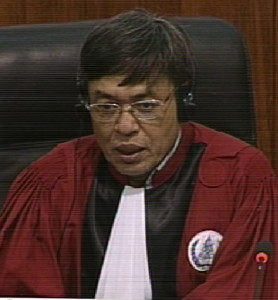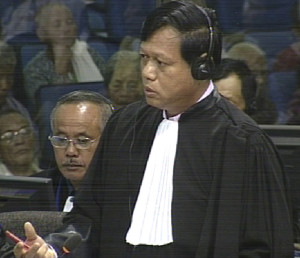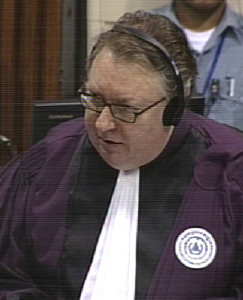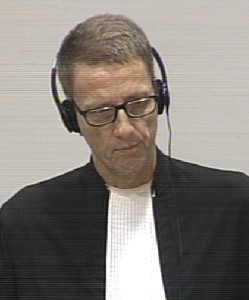Testimonies on Role of the Accused Continue
Today, anonymous Civil Party 2-TCCP-223 testified in the morning sessions about the role of the accused. He provided information regarding purges of cadres, including his uncle and father, as well as the treatment of Buddhists and former Lon Nol officials and soldiers. In the afternoon, witness Tuch Sithan gave her account on the disappearance of several cadres, her marriage, and the role of the accused. Today’s hearing was mainly focused on the role of Nuon Chea.
Delivering Messages and Accommodating Guests

Trial Chamber President Nil Nonn
Presiding judge Nil Nonn announced that 2-TCCP-223 would be heard in the morning and another witness via audiovisual link in the afternoon. All parties were present. There was a reserve witness 2-TCW-871. Civil Party 2-TCCP-223 was only referred to by his pseudonym, as he was part of another case.
The floor was then handed to the Civil Party lawyers. Counsel Lor Chunthy started his line of questioning by asking where he lived and what he did prior to 1975. The Civil Party replied that he was at a university in Battambang after the liberation in 1975. Prior to this he lived in Bakan District in Pursat Province. He was a messenger. After the liberation he was at Battambang University where he remained a messenger and was in charge of telegrams and receiving domestic guests. He was with Horn at the time. He was given such assignment to participate in the liberation of the country. His office was referred to as the Party’s School. The Northwest Zone Committee included Ruos Nhim and Khan, alias Kheu. He would deliver messages when there were reports from the zone level to the lower levels (i.e. the sector) and the other way around. Khan alias Kheu would receive the messages. He received messages from Sector 4 and 5. Hoeun was the sector committee of Sector 5 and Suy or Sou the one of Sector 4.
The guests came from Pursat and Battambang and attended study sessions. Occasionally, he would take guests to Angkor Wat. He also received Chinese and Korean guests. He said that this was in November 1976. He did not take them to any places. Some delegates assisted them with their work. He remained at the university between 1976 and early 1977. He then joined Zone 560 Office. This was located at Road 5. At that time, he was in charge of receiving delegates and deliver documents to Unit 870. He never received any leaders from Office 870. Instead, he received delegates from the sector level. The people who attended the meetings included the sector committees. The meetings were held between every month to every six months. The meetings related to the strengthening of the core force within the army. He was sent to Phnom Penh in late 1977 during the harvesting season. “I was accused of being part of the traitorous network.” They were said to be related to those who were accused of being traitors. This included the people who supervised him, such as San. Say was his uncle. Say was the office chief of Zone 560 Office. His father was in charge of the industrial sector of the province and always attended meetings at Office 560 together with the leaders from the zone and sectors. He received information from Nuon Chea who had brought him to Phnom Penh that Say was the traitor of the party. Nuon Chea said that they had brought

Civil Party Lawyer Lor Chunthy
them to Phnom Penh “in order to help us escape the killing by those traitorous leaders.” Nuon Chea said that Say was a traitor. The location consisted of several buildings named A, B, C, D, E, and the like. There was a large conference hall. When he was transported to Phnom Penh, they were dropped off at the Railway Station and then transported to the Royal University, where they stayed at for a few months. The meeting lasted three days. After the meeting, they were shown films about the heroism of Khmer people and Chinese films. He was transported from the Royal University to the meeting by a tourist bus. This was far from the Royal University of Phnom Penh. They travelled along National Road 4. The compounds were enclosed by zinc fence. He saw Nuon Chea when he went onto the stage. After the meeting he was sent to Chang Chamres where he was assigned to clear the pond. He was then sent back to Phnom Penh, where he was assigned to join the Khmer Soviet Hospital at the pharmacy and other hospitals, including Calmette. Ieng Tirith invited them for a meeting when Phnom Penh was about to fall to tell them about the route that they could take to escape.
Mr. Chunthy inquired whether he had tried to find out more about his father’s disappearance until today. He replied that he tried to look for him at Tuol Sleng Prison, but did not see him amongst the photographs. He had heard, however, that he was sent through S-21 and executed there. He did not have any hope about meeting him again, as he knew that he was killed. With this, Mr. Chunthy concluded his line of questioning and the floor was handed to the Co-Prosecutors.
Arrest of his Uncle and Father
International Senior Assistant Prosecutor Dale Lysak who wanted to know whether he remembered when the last time was that he saw his father. He answered that he last saw his father when he was told that those who arrested his father came from Phnom Penh. His father was the deputy chief and Horm was the third member, who was in charge of commerce. Mr. Lysak asked about his father’s name. The Civil Party replied that his father’s alias was Sor Chet and his original name Cheam. Mr. Lysak provided two documents to the Civil Party that showed S-21 records and the name Chet and wanted to know whether this was his father.[1] The Civil Party confirmed this. Mr. Lysak wanted to know who told him that his father and uncle had been arrested.[2] He replied that he had heard that people from Phnom Penh went to arrest them, but he did not witness the actual event. A bodyguard from Office 560 told him that. At this point, the president adjourned the hearing for a break.
After the break, Mr. Lysak inquired whether his uncle worked at the zone office. He replied that the zone office was located on National Road 5 and that his uncle worked at this office. His uncle knew Khieu Samphan and Nuon Chea because he worked and lived with them before 1975. This was in Phnom Penh, the Civil Party said.
Treatment of Buddhists

International Senior Assistant Prosecutor Dale Lysak
Mr. Lysak inquired what happened to the pagodas and monks in his home district in the regime. He replied that he knew from a meeting before the liberation day that when the regime came to power, they would allow “only two classes, that were the labour and peasant classes.” Other classes, he said, were not allowed. Mr. Lysak referred to the Civil Party’s supplementary submission, in which he had said that “it was not necessary to practice any religious beliefs.”[3] Mr. Lysak inquired whether Khan alias Khoeu was the one who spoke at the meeting. The Civil Party replied that Khan was the leader of the zone. Leaders would emphasize these points during regular meeting. He did not know Khan’s alias. He knew that Khan worked with Ruos Nhim. He said this happened “all over the country: monks and pagodas were not allowed to continue.” Mr. Lysak wanted to know how he knew that Nuon Chea issued an order for the demolition of pagodas.[4] He replied that Khan met Nuon Chea often. The Civil Party was close to Khan, who had told him about Nuon Chea’s order. Nuon Chea and Khan would meet at several locations. He knew that Nuon Chea was from Ampil Prohong in Battambang. He knew this from his mother, because his mother used to live with Nuon Chea and he himself had lived with Nuon Chea when he was young. He lived in Phnom Penh somewhere between 1958 and 1960, he said.
Lon Nol Soldiers and Purges
Asked about the treatment of Lon Nol soldiers and officials, he said that “there were killings” of these people. He did not know this from his father. To his knowledge, they purged people in the zone. Initially, they purged people in the North Zone. After having purged these people, they purged people in the Northwest Zone, he said. “They started to purge cadres at the lower level, and they put in place the cadres from the Southwest Zone.” The purged people never returned. “Those who purged others were finally purged by other people, and that led finally to the collapse of the regime.” The cadres who were sent from the Southwest Zone to the Northwest Zone stayed at the university. These cadres were female cadres. The male cadres were assigned to stay at Veal Bay Chan. The Civil Party prepared accommodation for them. He did not know the total number of people. To refresh his memory, Mr. Lysak referred to his OCIJ interview, in which he had said that around 500 to 600 cadres were sent in.[5] The Civil Party confirmed this number. Mr. Lysak asked about meetings that he had mentioned in his interview.[6] He replied that he knew about the meetings, but did not know the content of the meetings. Mr. Lysak quoted his interview. The Civil Party had said that his uncle told him about meetings that took place between Pol Pot and Nuon Chea.[7] He replied that Nuon Chea chaired meetings at Battambang University, where he saw him. “He was in a white shirt and black trousers.” As for Pol Pot, he said that they learned through radio communication that Pol Pot would come, but later they learned that Son Sen came instead. He became close to San when he came to work in Office 560. His uncle Say told him about Pol Pot and Son Sen.
Mr. Lysak then inquired how long after the arrest of his uncle and father he was arrested. He replied that he had made a mistake before and that he was arrested around three or four months later. All of the relatives of his father died. “None of them survived,” he said. As for the members living in the village, he was told that they were persecuted and subject to arrests. “Later on, all of them were killed.” He did not see any of them after the end of the war.
Sent to Phnom Penh
Mr. Lysak then wanted to know what he did during the period that he was at the Royal University before he was sent to a three day meeting with Nuon Chea. He replied that they were “allowed to rest” there, but had to write down their biographies. Mr. Lysak asked whether other people were brought from Battambang to Phnom Penh with him, and if yes, how many. He answered that there were hundreds of people, including elders and youths. Mr. Lysak wanted to know who these other people were. The Civil Party answered that some of them were former soldiers and whose relatives had been arrested. They were sent “in the same condition” as the Civil Party.
Three Day Meeting
Mr. Lysak inquired whether Nuon Chea was the only person that spoke during the three day meeting that the Civil Party attended. He replied that he did not know the other people and only knew Nuon Chea. The latter spoke about the reasons why he and the others were brought to Phnom Penh. They were brought to Phnom Penh “in order to survive” the persecutions in the zone by traitorous people. They were sent in various groups. For example, the elderly people would be put in separate groups from the youths. Mr. Lysak asked whether he believed that people like his uncle were traitors and that they needed to be protected from these people, which the Civil Party denied. “What he said and the real event were not consistent.” He could not recall how long Nuon Chea spoke, but could recall that he spoke during these few days.

Nuon Chea Defense Counsel Victor Koppe
He recalled that Nuon Chea said that the Civil Party’s uncle betrayed Angkar and were arrested and that the cadres killed Tou Samouth.[8] When Mr. Lysak inquired about the smashing of Tou Samouth, Nuon Chea Defense Counsel Victor Koppe said that the Civil Party had referred to the smashing of this person by traitorous people. Mr. Lysak asked whether Nuon Chea said that people like his uncle had been killed because of their alleged activities. He recounted that Nuon Chea accused Say of having been a messenger of Tou Samouth during the 1950s and 1960s and that Say had been a traitor infiltrated in the party to kill Tou Samouth. “Tou Samuth was not killed during the reign of the Khmer Rouge.” Nuon Chea did not speak about leaders of other zones. There were hundreds of people at the meeting. Some of the participants disappeared, while others survived. Mr. Lysak referred to the Civil Party Application, in which he had said that some of the people were taken to be executed and wanted to know why he had thought so.[9] He replied that there was a saying at the time: “it’s no use to keep those inactive people.” Those who could not achieve their work quota and those who were sick often were called inactive and would be taken away and disappeared. He did not know whether they were killed or not, but knew that they were taken away.
At this point, the presiding judge Nil Nonn informed the parties that after the lunch break, the reserve witness would probably be heard via audiovisual link. However, as that witness seemed to have health issues, the Civil Party might continue his testimony after the break.
New Witness: Tuch Sithan
After the lunch break, the next witness was heard via audiovisual link. Witness Tuch Sithan was born on 2 January 1965 and currently lives in Paris. The floor was then handed to the Co-Prosecutors. International Senior Assistant Prosecutor Vincent de Wilde said that he would cover three topics: her marriage, the role of the accused and disappearances at her work. She said that she had left, because her sister-in-law asked her mother when she was sixteen to accompany her. She initially thought that she would accompany them, but she did not think that it would be impossible for her to come back. Mr. de Wilde asked whether her brother was Tuch Ream, who was the director of Kampong Som port, which the witness confirmed. She was instructed to go to the Khmer-Soviet Hospital in April 1975, where she worked with the medics. Not many people understood the French language. Initially, she was one of the three people in the group.
Disappearances
The chief was called Oul. After he disappeared, his wife remained at the hospital for three or four months. Ms. Sithan assisted her supervisor at the time. His name was Say, but this person also disappeared a few months later. Ieng Tirith and Sou were her superiors. Ms. Sithan prepared medicine, as she knew how to read French. The person disappeared around three or four months after 17 April. After this, she did not have any contact with the hospital staff anymore. She was not aware of any arrests, but she did not hear the name Say anymore.
Mr. de Wilde referred to S-21 records and confessions that mentioned the name.[10] She replied that when she left for the Ministry of Social Affairs, she had no contact with the hospital anymore and did not know about the entry date. Ieng Tirith was in charge of the Ministry of Social Affairs and Health.
The witness would distribute medicine according to data that she had. A person who came from France was in charge of the hospital, but since that person “was not active in work performance” Ms. Sithan had to intervene and do this work. She could not recall the name of the person, but could recall that three people came from France to work at Ieng Tirith’s place. There were meetings at hospitals that were chaired by Sou. During meetings, they encouraged them to defend Angkar. During both big and small meetings they were told that they had to “smash the enemy.”
She did not know a person called Kan Phan well, but she knew that this person was a driver. Mr. de Wilde read an excerpt of an interview of this person.[11] She recounted that she saw a family of New People who disappeared, but their disappearance was not mentioned in the meetings. “They were taken away and smashed.” This was on 17 April. When people in the ministry started to “investigate in each other”, the situation intensified in late 1977 or early 1978. During the meetings they talked about the KTB, CIA and the yuon. They were most worried about the CIA and the KTB, Ms. Sithan said.
Marriage
Turning to his next topic, Mr. de Wilde inquired about her marriage. She recounted that it took place in September 1976 at the Ministry of Social Affairs. Three couples were married at this time: Try, her couple, and Thorn from France. Bong Sou was presiding over the ceremony, she said. “She acted as our parents during the wedding ceremony.” She could not recall how many couples were arranged at another time. Neither Sou nor Ieng Tirith told her about the purpose of marriages, but told them that they acted as their parents. “People in their 20s were arranged by Angkar.”
Sou’s husband worked at the Ministry of Social Affairs, whose chief Sou was. A Khmer Leu was Sou’s deputy. This person’s wife told her that Ms. Sithan was going to get married. Mr. de Wilde inquired whether she knew who she marry. She told the person that if Angkar wanted her to get married, Angkar would have to ensure her about the background of her husband. She did not know whether her husband had already a French wife, since he came from France. “I was reluctant at the time. I could not get married to someone who I did not know clearly.” She had met him only once and initially refused to marry him. On the second approach she asked for them to guarantee that he had neither a girlfriend, nor a fiancé, nor a wife.
The president informed the parties that there would not be a break this afternoon in order to compensate time that had been lost after the lunch break.
She was approached two or three months before the decision was made for her to marry. In fact, she had romantic feelings towards the person’s secretary, as she knew him better and he had a “better physical appearance” than her husband. She had to force herself to marry him. She was scared that she would be married to a peasant if she did not agree. Sou had intended for her to get married to a messenger. The witness did not have direct contact with Ieng Tirith, as it was Sou who arranged the marriage for her. Sou knew her husband. Her brother did not attend her wedding, nor did her parents. She had no time to visit her parents since she left them in 1972.
Mr. de Wilde inquired whether there were arrangements for the couples to sleep together on the first wedding night and subsequent nights. The witness denied this. Mr. de Wilde read an excerpt of her interview, in which he had stated that Sou ensured that there would be a moment of intimacy between her and her husband, and wanted to know whether this was the same for other couples.[12] Ms. Sithan recounted that they were in a separate room from the other couple, but at the same floor. Another couple lived in another house. Sou told her that Sou’s parents were taken away and told Ms. Sithan to stop living there and go to the house where the third couple was living. “It was kind of a flat while Sou’s house was a villa.”
At this point, Mr. Koppe interjected and said that the testimony did not seem relevant. Heng Samrin’s testimony, instead, would have been very interesting. The president informed the Co-Prosecutor that the questions should be focused. Mr. de Wilde inquired whether she became pregnant and when she had her baby. She replied that she became pregnant five or six months later. Her baby was born on January 13, 1978.
Role of the Accused
She did not know at the time who Nuon Chea was. He came in a jeep with his bodyguards and drivers to see them. There were no people living in Phnom Penh at the time. He spoke during a meeting. At that time, people were not put in different categories yet. The number of participants could run into thousands, she said. She did not know whether a meeting took place. She had not known Ieng Tirith in person at first, and saw her meeting Sou. The first meeting was for those who were party members, and then there was a general meeting that everyone could attend. Mr. de Wilde pointed to minutes of a meeting of 9 October 1975.[13] There was one instance, she recounted, that a Khmer-Chinese woman was married to a Khmer man. She told her that Nuon Chea had a more superior role to Ieng Tirith. K-1 was Ieng Tirith’s husband’s ministry, she said. She said that Ieng Sary was in charge of the Ministry of Foreign Affairs. She was not familiar with K-3, but said that it could have been for the hospital.
She only attended general meetings and not those meetings that were organized for party members. She did not know the specific attendants in Phnom Penh. They were told about the victory in a “large gathering” that took place shortly after the victory.
Mr. de Wilde asked whether Ieng Tirith had ever mentioned bad relations with Nuon Chea.[14] Mr. Koppe objected to this question: Ieng Tirith had said this to the Pre-Trial Chamber many years after the fact and in a state that was not to be determined as mental fitness. Moreover, the question was “completely leading”. The objection was overruled. The witness replied that she did not know who ordered the taking away of her husband. She did not know all the positions the other cadres held.
At this point, there were some technical issues and court was adjourned slightly early. It will continue tomorrow, November 22, 2016, at 9 am.
[1] E3/9646, at 01017058 (KH); E3/9996. At 10054.
[2] E3/9996.
[3] E3/6636a, at 00579467 (KH), 00859259 (EN), no French translation available.
[4] E3/6636a.
[5] E3/9477, at answers 31-32.
[6] E3/9477
[7] E3/9477, at answer 49 and 51-52.
[8] E3/5000, at 00558234 (KH), 00807151 (FR), 00793364 (EN).
[9] E3/5000, at 00558234 (KH), 00793364 (EN), 00807151 (FR).
[10] E3/4377; E3/1857.
[11] E3/447, at answer 41 and 42.
[12] E3/378, a 00349535 (KH), 00342203 (FR), 00345541 (EN).
[13] E3/1733.
[14] E3/39.
